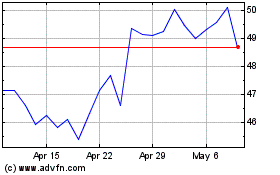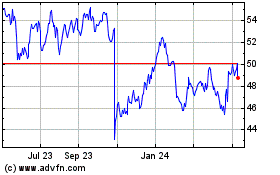Sanofi Pays $25 Million to Settle Bribery Charges -- Update
05 September 2018 - 4:39AM
Dow Jones News
By Samuel Rubenfeld
French pharmaceutical company Sanofi agreed to pay $25.2 million
to resolve Securities and Exchange Commission allegations that its
subsidiaries made bribery payments to win business.
The alleged schemes spanned multiple countries and involved
bribes to government procurement officials and health-care
providers to receive tenders and increase prescriptions of the
company's products, the SEC said. The alleged payments violated the
Foreign Corrupt Practices Act, which bars bribes of foreign
officials for business purposes, the SEC said.
The SEC said Sanofi violated the books-and-records and
internal-control provisions of the FCPA. The company neither admits
nor denies the SEC's allegations.
Sanofi agreed to a cease-and-desist order and agreed to pay
$17.5 million in disgorgement, $2.7 in interest and a $5 million
civil penalty.
The company has strengthened its compliance program in the wake
of the investigation, Sanofi Chief Executive Olivier Brandicourt
said in a statement. "We will continue to strengthen internal
controls, anti-bribery and corruption compliance programs, and our
oversight and training of teams worldwide."
The probe began after the company received a series of anonymous
allegations that wrongdoing had occurred between 2007 and 2012 in
parts of the Middle East and East Africa, the company said in 2014.
In subsequent annual reports, the company had said alleged
wrongdoing may have happened as recently as 2015.
Earlier this year, the company said the Justice Department had
ended its yearslong investigation into potential FCPA violations by
Sanofi.
According to the SEC, Sanofi generated funds for the illicit
payments through fake expenses improperly recorded in the company's
books and records. The firm's foreign subsidiaries carried out the
various schemes, the SEC said.
Sanofi's distributors in Kazakhstan were used as part of a
kickback scheme from which officials were paid to ensure Sanofi
received tenders at public institutions; the kickbacks were tracked
in internal spreadsheet and coded as "marzipans," the SEC
alleged.
Pay-to-prescribe schemes were used by the units based in Lebanon
and the United Arab Emirates to induce health-care providers to
increase their prescriptions of Sanofi products across the Middle
East and Persian Gulf region, the SEC said.
Bribery-connected pharmaceutical sales continue to be a problem
despite multiple enforcement actions involving the industry, and
life sciences more generally, said Charles Cain, who leads the FCPA
unit of the SEC's enforcement division.
"While bribery risk can impact any industry, this matter
illustrates that more work needs to be done to address the
particular risks posed in the pharmaceutical industry," he said in
a statement.
Write to Samuel Rubenfeld at samuel.rubenfeld@wsj.com
(END) Dow Jones Newswires
September 04, 2018 14:24 ET (18:24 GMT)
Copyright (c) 2018 Dow Jones & Company, Inc.
Sanofi (NASDAQ:SNY)
Historical Stock Chart
From Mar 2024 to Apr 2024

Sanofi (NASDAQ:SNY)
Historical Stock Chart
From Apr 2023 to Apr 2024
